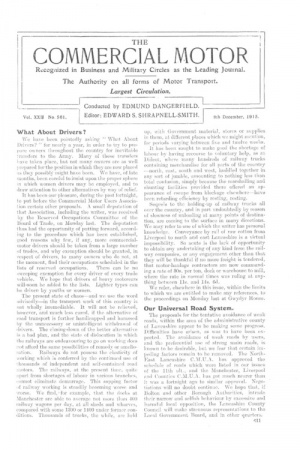What About Drivers?
Page 1

If you've noticed an error in this article please click here to report it so we can fix it.
We have been pointedly asking, " What About Drivers? " for nearly a year, in order to try to prepare owners throughout the country for inevitable transfers to the Army. Many of these transfers have taken place, but not many owners are as well prepared for the position in which they are now placed as they possibly might have been. We have, of late months, been careful to insist upon the proper sphere in which women drivers may he employed, and to draw attention to other alternatives by way of relief.
it has been our pleasure, during the past fortnight, to put before the Commercial Motor Users Association certain other proposals. A small deputation of that Association, including the writer, was received by the, Reserved Occupations Committne of the 'Board of Trade, on Monday last. The deputation thus had the opportunity of putting forward, according to the procedure which has been established, good reasons why few, if any, more commercialmotor drivers should be taken from a large number of trades, and why exemption should be granted, in respect of drivers, to many owners who do not, at the moment, find their occupations scheduled in the
lists of reserved occupations. There can be no sweeping exemption for every driver of every trade vehicle. We hope that drivers of heavy motorcars will.soon he added to the lists. Lighter types can be driven by yotiths or women.
The present state of chaos and we use the word advisedly—in the transport work of this country is not wholly irremediable. It will not be relieved, however, and much less cured, if the alternative of road transport is further handicapped and harassed by the unnecessary or unintelligent withdrawal of drivers. The closing-down of the better alternative is a. had plan, and the state of dislocation in which the railways are endeavouring to go on working does tot afford the same possibilities of remedy or amelio ration. Railways do not possess the elasticity of working, which is conferred by the continued use of thousands of independent and self-contained road motors. The railways, at the present time, quite apart from shortages of labour in various branches, eannot eliminate demurrage.. This sapping factor of railway working is steadily becoming worse and worse. We find, for example, that the docks at Manchester are ablc to average not more than 400 railway wagons per day, at all sheds and wharves, compared with some 1300 or 1400 under former conditions. Thousands of trucks, the while, are held up, with Government material, stores or supplies in them, at different places which we might mention, for periods varying between five and twelve weeks. It has been sought to make good the shortage of labour by having recourse to voluntary help, as at Didcol, where many hundreds of railway trucks containing merchandise for all partg of the country —north, east, south and west, huddled together in any sort of jumble, amounting to nothing less than total confusion, simply because the marshalling and shunting facilities provided there offered an ap pearanc.e of escape from blockage elsewhere have been retarding efficiency by resting, resting.
Sequels to the holding-up of railway trucks all over the country, and in part undoubtedly by reason of slowness of unloading at many points of destination, are coining to the, surface in many directions. We may refer to one of which the writer has personal knowledge. Conveyance by rail of raw cotton from Liverpool to north and east Lancashire is a virtual impossibility. So acute is the lack of opportunity to obtain any undertaking of any kind from the. railway companies, or any engagement other than that they will be thankful if no more freight is tendered, that motor-haulage contractors are now commanding a rate of 30s. per ton, dock or warehouse to mill, where the rate in normal times was ruling at anything between 14s. and 14s. 6d.
We refer, elsewhere in this issue, within the limits to which we are entitled to make any references, to the proceedings on Monday last at GwydYr House.
Our Universal Road System.
The proposals for the tentative avoidance of weak roads, within the area of the administrative county of Lancashire appear to be making some progress. Difficulties have arisen, as WRS1 to have been expected. The avoidance of weak roads by users, and the preferential use, of strong main roads, is known to he desirable, but we fear that certain impeding factors remain to be removed, The NorthEast Lancashire C.:W.-U.N. has approved the schedule of roads whick were listed in our issues of the 11th ult., find the Manchester, Liverpool and Counties C.M.U.A.. has got much nearer than it was a fortnight ago to similar approval. Negotiations will no doubt continue. We hope that, if Bolton and other Borough Authorities, intrude their narrow and selfish behaviour by excessive and harmful local opposition, the Lancashire County Council will make strenuous representations to the Local Government Board, and in other quarters,
























